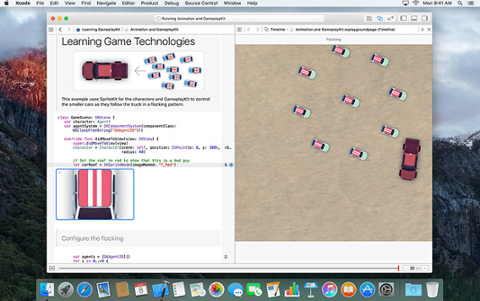 Apple plans on introducing a Swift-centric app-building curriculum to 30 community colleges across the country. (For those who don't know, Swift is Apple's new-ish open-source language for building iOS apps, and is rapidly eclipsing the aging Objective-C.) The program, which will kick off with the 2017-18 school year, will teach tens of thousands of students to build apps. Within the Austin Community College District (ACC) alone, some 74,000 students will have an opportunity to take the course, which requires no prior experience in programming. Apple is no stranger to the education business: earlier this year, it began hosting Apple Store classes in everything from coding to photography. The iTunes platform offers Stanford’s suite of Swift-development classes. For kids, there’s also Swift Playgrounds, an iOS app that teaches coding in a fun environment. For Apple, the advantage of pushing Swift classes to masses of developers (and aspiring developers) is obvious: it trains a whole new generation to create apps for iOS. That helps sustain the iOS app ecosystem, which ultimately puts more money in Apple’s pocket (and to be fair, those developers may earn quite a bit in the process). But no matter what ecosystem they build for, developers face a number of challenges. According to comScore’s 2017 U.S. Mobile App report, major channels for app discovery such as app stores and word-of-mouth have seen either declines or stagnation over the past year, and users tend to stick with the apps they know rather than download lots of new ones. If that didn’t make things difficult enough, the sheer number of apps available in the iOS and Android app stores make discovery a difficult feat, particularly in the short term; while estimates vary, developers generally have but a few weeks or months to “hook” an audience with their app. All that being said, app stores continue to offer quite a bit of opportunity. Millennials are more willing than older cohorts to pay for apps, for instance; and the rise of new mobile technologies such as augmented reality (AR) will ensure fresh markets for those with great ideas. For those interested in programming for iOS, taking an in-person course can quickly increase your knowledge. But online learning—whether independently or via a MOOC—is also effective when it comes to adopting the basics.
Apple plans on introducing a Swift-centric app-building curriculum to 30 community colleges across the country. (For those who don't know, Swift is Apple's new-ish open-source language for building iOS apps, and is rapidly eclipsing the aging Objective-C.) The program, which will kick off with the 2017-18 school year, will teach tens of thousands of students to build apps. Within the Austin Community College District (ACC) alone, some 74,000 students will have an opportunity to take the course, which requires no prior experience in programming. Apple is no stranger to the education business: earlier this year, it began hosting Apple Store classes in everything from coding to photography. The iTunes platform offers Stanford’s suite of Swift-development classes. For kids, there’s also Swift Playgrounds, an iOS app that teaches coding in a fun environment. For Apple, the advantage of pushing Swift classes to masses of developers (and aspiring developers) is obvious: it trains a whole new generation to create apps for iOS. That helps sustain the iOS app ecosystem, which ultimately puts more money in Apple’s pocket (and to be fair, those developers may earn quite a bit in the process). But no matter what ecosystem they build for, developers face a number of challenges. According to comScore’s 2017 U.S. Mobile App report, major channels for app discovery such as app stores and word-of-mouth have seen either declines or stagnation over the past year, and users tend to stick with the apps they know rather than download lots of new ones. If that didn’t make things difficult enough, the sheer number of apps available in the iOS and Android app stores make discovery a difficult feat, particularly in the short term; while estimates vary, developers generally have but a few weeks or months to “hook” an audience with their app. All that being said, app stores continue to offer quite a bit of opportunity. Millennials are more willing than older cohorts to pay for apps, for instance; and the rise of new mobile technologies such as augmented reality (AR) will ensure fresh markets for those with great ideas. For those interested in programming for iOS, taking an in-person course can quickly increase your knowledge. But online learning—whether independently or via a MOOC—is also effective when it comes to adopting the basics. Apple Introduces Swift Curriculum to Schools
 Apple plans on introducing a Swift-centric app-building curriculum to 30 community colleges across the country. (For those who don't know, Swift is Apple's new-ish open-source language for building iOS apps, and is rapidly eclipsing the aging Objective-C.) The program, which will kick off with the 2017-18 school year, will teach tens of thousands of students to build apps. Within the Austin Community College District (ACC) alone, some 74,000 students will have an opportunity to take the course, which requires no prior experience in programming. Apple is no stranger to the education business: earlier this year, it began hosting Apple Store classes in everything from coding to photography. The iTunes platform offers Stanford’s suite of Swift-development classes. For kids, there’s also Swift Playgrounds, an iOS app that teaches coding in a fun environment. For Apple, the advantage of pushing Swift classes to masses of developers (and aspiring developers) is obvious: it trains a whole new generation to create apps for iOS. That helps sustain the iOS app ecosystem, which ultimately puts more money in Apple’s pocket (and to be fair, those developers may earn quite a bit in the process). But no matter what ecosystem they build for, developers face a number of challenges. According to comScore’s 2017 U.S. Mobile App report, major channels for app discovery such as app stores and word-of-mouth have seen either declines or stagnation over the past year, and users tend to stick with the apps they know rather than download lots of new ones. If that didn’t make things difficult enough, the sheer number of apps available in the iOS and Android app stores make discovery a difficult feat, particularly in the short term; while estimates vary, developers generally have but a few weeks or months to “hook” an audience with their app. All that being said, app stores continue to offer quite a bit of opportunity. Millennials are more willing than older cohorts to pay for apps, for instance; and the rise of new mobile technologies such as augmented reality (AR) will ensure fresh markets for those with great ideas. For those interested in programming for iOS, taking an in-person course can quickly increase your knowledge. But online learning—whether independently or via a MOOC—is also effective when it comes to adopting the basics.
Apple plans on introducing a Swift-centric app-building curriculum to 30 community colleges across the country. (For those who don't know, Swift is Apple's new-ish open-source language for building iOS apps, and is rapidly eclipsing the aging Objective-C.) The program, which will kick off with the 2017-18 school year, will teach tens of thousands of students to build apps. Within the Austin Community College District (ACC) alone, some 74,000 students will have an opportunity to take the course, which requires no prior experience in programming. Apple is no stranger to the education business: earlier this year, it began hosting Apple Store classes in everything from coding to photography. The iTunes platform offers Stanford’s suite of Swift-development classes. For kids, there’s also Swift Playgrounds, an iOS app that teaches coding in a fun environment. For Apple, the advantage of pushing Swift classes to masses of developers (and aspiring developers) is obvious: it trains a whole new generation to create apps for iOS. That helps sustain the iOS app ecosystem, which ultimately puts more money in Apple’s pocket (and to be fair, those developers may earn quite a bit in the process). But no matter what ecosystem they build for, developers face a number of challenges. According to comScore’s 2017 U.S. Mobile App report, major channels for app discovery such as app stores and word-of-mouth have seen either declines or stagnation over the past year, and users tend to stick with the apps they know rather than download lots of new ones. If that didn’t make things difficult enough, the sheer number of apps available in the iOS and Android app stores make discovery a difficult feat, particularly in the short term; while estimates vary, developers generally have but a few weeks or months to “hook” an audience with their app. All that being said, app stores continue to offer quite a bit of opportunity. Millennials are more willing than older cohorts to pay for apps, for instance; and the rise of new mobile technologies such as augmented reality (AR) will ensure fresh markets for those with great ideas. For those interested in programming for iOS, taking an in-person course can quickly increase your knowledge. But online learning—whether independently or via a MOOC—is also effective when it comes to adopting the basics. 


